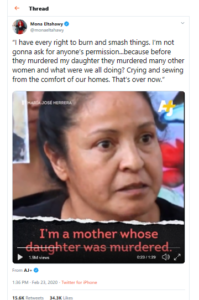Women chanting with green bandanas around their necks. Arms raised to the sky with pictures of victims that have been killed only for being a woman. In the background, you hear the anthem that is making the voice of the silence heard. This is a protest of women fighting for their lives. A fight to stop femicides.
Femicides in Latin America
According to the 2016 report “A Gender Analysis of Violent Deaths,” in the list of most femicides around the world, a total of 14 countries with more femicide cases come from Latin America. Femicide happens when a woman or girl is killed by a man on account of their gender. There has been an increase in these crimes through El Salvador, Honduras, Chile, Colombia, Bolivia, Mexico and Argentina to name a few.

Screenshot by Mayra Palomo
Recently, places like Chile and Mexico have been put under the spectrum. These two countries have been having issues addressing femicides. In 2019, Chile had 44 femicides registered in the country. And in Mexico, it is estimated that three women are killed a day, according to an article in Latin American Post.
In Chile, there has been a movement created to fight for the rights of women. In 2019, some Chilean women gathered in a feminist flash mob outside the supreme court building in Santiago. They chanted to “Un violador en tu camino” (“A rapist in your way”) a song that now has become an anthem around the world in the fight for violence against women. It has been chanted by women all around Latin America, and also by European nations like France, Germany and Spain.
Currently, in Chile, only 8% of all rapes end up with a sentence according to an article from Quartz. The movement specifically addressed the failure of the justice system to protect the lives of women. With the lyrics of this song, they wanted to be heard loud and clear.
“The rapist is you.
The rapist is you.
It’s the cops,
The judges,
The state,
The president.
The oppressive state is a rapist.
The oppressive state is a rapist.
The rapist is you
The rapist is you”
The start of a movement
In February of this year, the death of 25-year-old Ingrid Escamilla and 7-year-old Fatima Cecilia Aldrighett has provoked indignation in Mexico.
Police found Ingrid Escamilla’s body mutilated in her apartment. The person alleged to be responsible for committing this crime was her husband. This case outraged the country not just because of such a horrific crime but because pictures of her dead body were publicized. Two tabloids leaked the images.
This case conjured protest in the National Palace in Mexico City. Women protested for the government of Mexico to act now on these crimes. Currently, in Mexico, the number of deaths classified as femicides in 2019 was more than 1,000 deaths.
At the beginning of 2020, the number of femicides continued to grow with the death of Fátima Cecilia Aldrighett Antón. The crime moved the people of Mexico and around the world for being about the life of a child. It became popular on social media and soon it gained the attention of several women. They were ready to protest and demand the government to pass laws to protect them.
Seven–year–old Fátima was found dead inside a plastic bag in Mexico City. A video of the child being abducted by a stranger who took her from the school has become viral on social media. The woman in the video and her husband were arrested for the death of the child.
Now different women in Mexico are coming out to fight for better laws to protect them. Mothers of victims are coming forward and protesting the government. A video of a mother named Yesenia Zamudio who lost her daughter to femicide also became viral on social media for delivering a strong and powerful speech. Feminist Mona Eltahawy tweeted about this mother and translated her moving speech.

Screenshot by Mayra Palomo
Social media becomes a vital tool
The action these women are taking is leading to a lot of attention on social media. The internet is being used as a tool to reach as many people as possible. This is something that high school senior Jhennifer Medina pointed out, “Now people decided to speak about what is happening in Mexico because of the use of the internet, they are shocked and wonder what is going on.”
People are becoming aware through the internet about what is happening in places like Chile, Mexico or other parts of Latin America affected by femicides.
What must be understood is what the women are demanding the government to act on. Women want government officials to act now on better laws to end violence against women. They want the officials to act sooner in cases of femicides. They demand police officials to not rape young women. And they want action to be taken now.
“I think the situation will get better for women, so long as the government becomes proactive in addressing these issues. The people have put tremendous pressure on the government,” said Jorge Rios, A history professor at East Aurora High School.
Lawmakers take a stance
Protestors in Chile continue to chant in hopes of pushing the government to create better laws. Women continue to spread awareness and continue to not be afraid to make themselves be heard. Now Chile’s femicide crimes have decreased, but this does not mean that they will stop protesting. They will continue until the government creates laws that protect them.
Mexican lawmakers are proposing an increment of 45 to 65 years for femicide crimes. They are also proposing to change sexual abuse sentences to 10 to 18 years in prison. The proposals were sent to the senate.
It will take time for a real solution. Until then, women afraid of walking down the street or mothers in grief will continue to make their voices heard.

